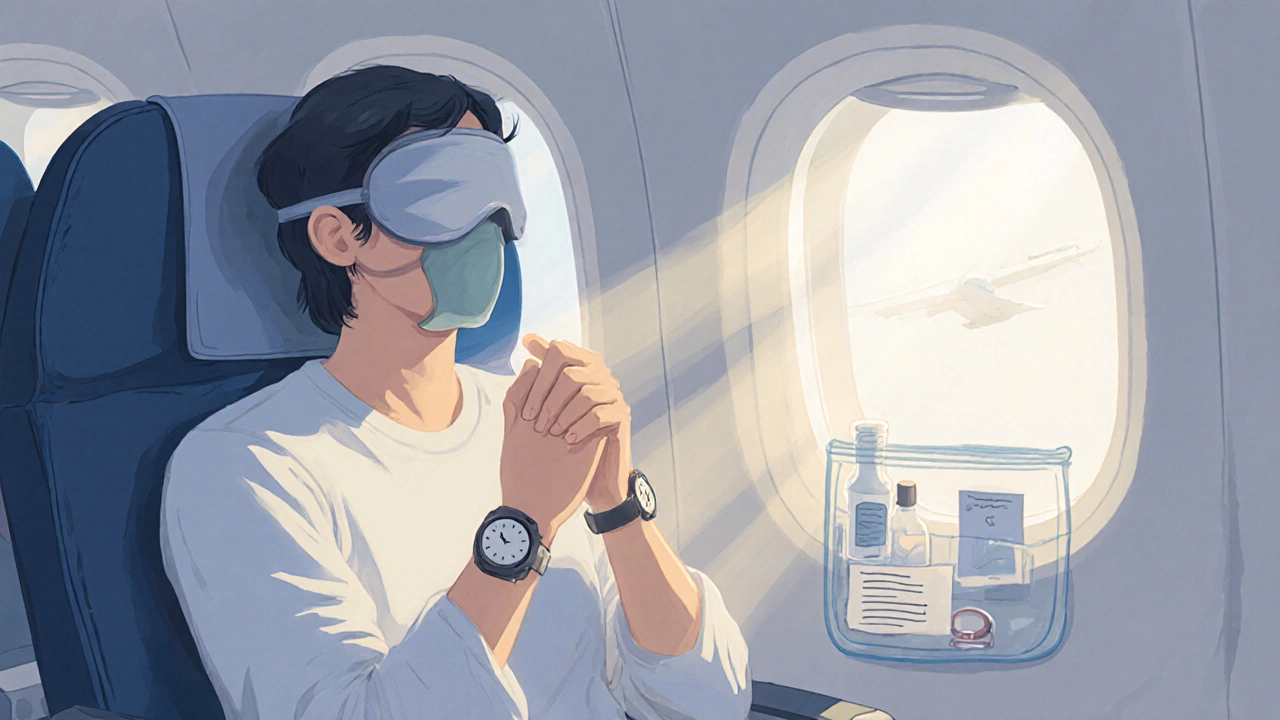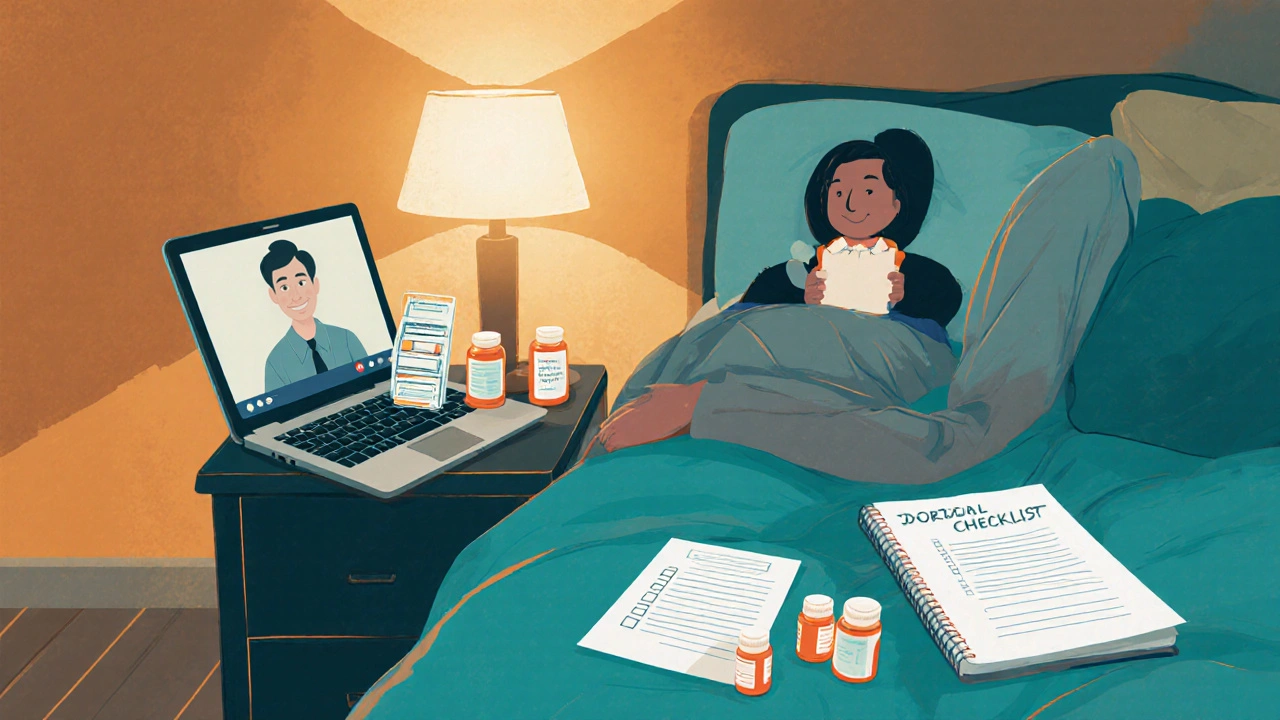Travel Medication & Mood Tracker
Medication Tracker
Mood & Trigger Log
Travel Plan Summary
Your personalized travel plan will appear here after logging medication and mood data.
When Bipolar Disorder is a mood disorder marked by alternating periods of mania and depression, planning a trip can feel overwhelming. The good news? With a solid plan, you can explore new places while keeping your mood stable.
Here’s a quick guide for traveling with bipolar disorder that keeps you safe and sane.
Quick Summary
- Schedule a pre‑trip check‑in with your psychiatrist or therapist.
- Pack a complete medication kit and a backup supply.
- Create a travel‑specific mood‑management plan.
- Choose travel insurance that covers mental‑health emergencies.
- Build a support network you can reach from anywhere.
Understanding the Challenge
About 2.8% of adults worldwide live with bipolar disorder, according to the World Health Organization. Travel disrupts routines, introduces new stressors, and often throws you across time zones-all triggers for mood swings. Recognizing that the journey itself is a potential stressor lets you treat it like any other part of your treatment plan.
Pre‑Trip Planning
Medication adherence is the cornerstone of stability. Before you book a flight, do the following:
- Schedule a video or in‑person appointment with your psychiatrist or Therapist. Ask if any dosage adjustments are needed for jet lag.
- Ask for a letter that explains your prescription. Many airlines and customs officials appreciate a doctor’s note, especially for controlled substances.
- Invest in travel insurance that explicitly covers psychiatric care. Look for policies that reimburse telehealth sessions abroad.
- Develop a written emergency plan: crisis hotline numbers, local hospitals, and a trusted contact back home.
These steps turn uncertainty into a checklist you can tick off before departure.

Packing and Routine
Beyond meds, a predictable Sleep Schedule helps stabilize mood. Pack these items:
- All prescribed pills in original containers, plus a 48‑hour backup supply.
- A portable pill organizer labeled for morning, afternoon, and night doses.
- A small notebook or a mood‑tracking app on your phone to log triggers, sleep, and medication times.
- Earplugs, eye mask, and a familiar pillowcase to recreate your home sleep environment.
- Healthy snacks and water bottle to avoid blood‑sugar swings that can exacerbate mood changes.
Maintain a daily routine as much as possible: same wake‑up time, regular meals, and a brief mindfulness practice each morning.
On the Road: Navigating Airports, Flights, and New Environments
Airport security can be stressful, especially if you’re carrying medication. Keep the doctor’s letter handy, and store meds in a clear, easily accessible bag. If you’re prone to anxiety, request a pre‑screening lane.
Long flights often disrupt circadian rhythms. To mitigate:
- Set your watch to the destination time as soon as you board.
- Stay hydrated and limit caffeine after the first few hours.
- Take short walks every hour to prevent stiffness and improve mood.
Once you arrive, give yourself a “re‑orientation” day-no major tours, just a walk around the neighborhood, a light meal, and a check‑in with your support person via video call.
Managing Mood Swings While Traveling
Identify common triggers: sleep loss, unfamiliar foods, social overload, or financial stress. When you feel a shift, use these quick tools:
- Deep‑breathing or 4‑7‑8 breathing for two minutes.
- Grounding exercise - name five things you see, four you can touch, three you hear, two you smell, one you taste.
- Take your scheduled medication immediately; don’t wait for the feeling to worsen.
- If symptoms intensify, call a local mental‑health hotline (many countries have 24‑hour crisis lines) or contact the nearest embassy for assistance.
Remember, asking for help is a sign of strength, not a weakness.

Post‑Trip Wrap‑Up
After you return, schedule a follow‑up with your prescriber within a week. Review your mood journal to spot patterns you didn’t notice on the road. If you needed extra medication, discuss whether a permanent dosage change is appropriate.
Give yourself a few days of low‑stress activities to readjust to home routines. Celebrate the fact that you successfully traveled-each trip builds confidence for the next.
Precautions Checklist
| Phase | Action | Why It Matters |
|---|---|---|
| Before | Doctor consultation & medication audit | Ensures dosages align with time‑zone changes |
| Before | Purchase mental‑health‑inclusive travel insurance | Provides coverage for emergencies abroad |
| During | Carry meds in original containers with backup | Prevents missed doses due to lost luggage |
| During | Maintain sleep‑wake timing | Reduces risk of mood destabilization |
| During | Use grounding or breathing techniques at first sign of mood shift | Stops escalation before it becomes severe |
Frequently Asked Questions
Can I bring my mood stabilizer on a flight?
Yes. Keep it in its original pharmacy bottle, carry a doctor’s note, and store it in your hand luggage. Most airlines allow controlled substances with proper documentation.
What if I experience a manic episode abroad?
Contact the nearest hospital’s psychiatric department immediately. Having the emergency plan you prepared before travel, including local crisis hotline numbers, will speed up help.
Do I need travel insurance for mental‑health coverage?
It’s strongly recommended. Look for policies that list “psychiatric care” or “mental health emergencies” explicitly, and verify coverage limits before you buy.
How can I keep my daily routine while crossing time zones?
Shift your sleep and meal times gradually a few days before departure. On the plane, use a sleep mask and set alarms to align with the destination’s schedule.
Is it safe to travel alone?
Solo travel is possible if you have a solid support network, clear emergency contacts, and a well‑prepared medication plan. Some people feel empowered; others prefer a travel companion.


Excellent overview; the emphasis on pre‑trip psychiatric consultation aligns with evidence‑based protocols. Incorporating a medication audit mitigates pharmacokinetic variability across time zones. Leveraging a portable pill organizer can streamline dose adherence while traveling. The suggestion to carry a physician’s letter addresses regulatory compliance for controlled substances. Overall, the checklist operationalizes best practices for mood stabilization on the road.